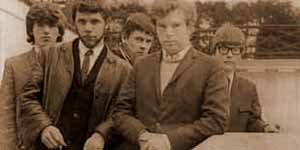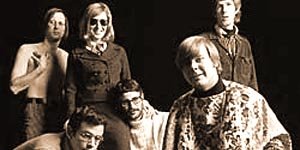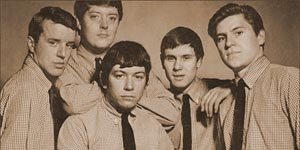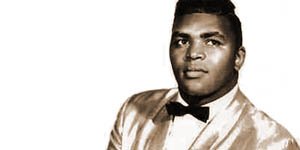Okay, We're Calling It The Beat Goes On, Part IX.

120. Them “Gloria”
(Van Morrison)
1963
Available on The Story of Them Featuring Van Morrison
This song is all about religion, and I don’t mean in retrospect now that we know how Van Morrison turned out, nor because of what Patti Smith did with it, nor because it shares a title with that U2 song (though, come on, the gloria in excelsis reference is obvious, and it’s very Irish Catholic of him to associate religious ecstasy with sexual climax). I mean that the recurring organ line is totally Zen, the rattling percussion as it builds to a climax is garage-dervish, and the three-chord post-chorus is so modal that Ravi Shankar took notes. Oh, and yeah, Morrison does his best Howlin’ Wolf impression, which he’s been doing ever since.
119. The United States of America “The Garden of Earthly Delights”
(Joseph Byrd/Dorothy Moskowitz)
1968
Available on The United States of America
Dorothy Moskowitz is one of the great unheralded female rock singers, the missing link between Grace Slick and Siouxsie Sioux. The United States of America only released the one album — as a student project, more or less — but it’s one of the most forward-looking records of all time. The synthesizer stabs which provide the backbone of the melody will find a new life in post-punk, and the intelligent, literate lyrics married to a doomy, unsettling aesthetic practically invents the less bleak side of goth (the Cure, Siouxsie again). I have no idea why this doesn’t regularly land on Best Albums of All Time lists; if it was anti-one-off prejudice, you’d think Layla and Other Assorted Love Songs would have been consigned to oblivion by now.
118. The Animals “We Gotta Get Out of This Place”
(Barry Mann/Cynthia Weill)
1965
Available on Retrospective
Perhaps the Animals were the only British Invasion group that could have pulled this song off. Despite the “rock & roll is born of hard times and economic depression” line that (mostly French, for some reason) critics will sometimes feed you, most of the British rock & rollers were staunchly middle-class. (The classic line about the Stones being art-school toffs while the Beatles were dockside yobs isn’t far off the mark; except that Sir Paul was never any kind of yob in his life.) Whether the Animals actually came from poverty I couldn’t say, but they studied their American blues so hard that they were the only British group to be believable at it. Mann/Weill wrote the song as the kind of thing Johnny Cash might deign to sing; Burdon and the boys turned it into a blind roar of desperate fury at the dead-end town that was hemming them in — of course, they would never be so famous or successful again.
117. Solomon Burke “Got to Get You Off My Mind”
(Solomon Burke/Dolores Burke/J. B. Moore)
1965
Available on The Very Best of Solomon Burke
Today, he’s the last giant standing, the only Sixties Soul Man who can still produce work that lives up to that legendary decade. Then? He was still pretty big. Rather than roar like Otis, scream like James, or shout like Wilson, he plays it closer to his chest: the song is about romantic failure, but he doesn’t sound all that broken up about it. Actually, those lyrics repay closer attention: “We had to stay together till June”? What’s the backstory there? The music is laid-back as well (a calypso version would be so easy); at a walking tempo, with different horns punctuating his lines (like Sly & the Family Stone would later do), and a female backup group that for once doesn’t sound overbearing or silly. It’s one of the slower-burners of the classic soul sides, but once it’s bitten you, it don’t let go.
116. The Grateful Dead “St. Stephen”
(Jerry Garcia/Robert Hunter/Phil Lesh)
1969
Available on Aoxomoxoa
Yeah, that’s right, the Dead. Wanna make somethin’ of it? No, seriously, we all know Deadheads are annoying (not least ’cause they’d grumble that some boring thirty-minute live version deserves this spot), but the Dead themselves are easier to swallow if you look at them as part of the continuum of San Francisco music in the late 60s, rather than being the world to themselves as they became in the 70s. This is a jazzy, twisty song, anchored by Jerry’s always-crisp guitar and never-steady singing voice, and it’s one of Robert Hunter’s finest lyrics for the band, full of memorable lines without meaning anything in particular at all. For devotees: Pig-Pen gets a surprise showcase, and check out the scream that ends the first verse. Holy Modal Rounders, Batman!
115. The Kinks “Village Green Preservation Society”
(Ray Davies)
1968
Available on The Kinks Are the Village Green Preservation Society
This has gotta be the most raucous, ramshackle defense of traditional values ever. That is, if we take it at face value. Which I’m perfectly willing to do; aside from strawberry jam (yecch), I’m on board with preserving everything in the song, including virginity. (My hero Chesterton would see a sympathetic soul here.) But Ray Davies is a master ironist, and too many online psychoanalysts have taken him at his word and then painted a picture of a man who’d like the world to return to 1911 or so. If we did that, we wouldn’t get the amazing, shattering production here; as Davies produced the song himself, I have to think he was aware of the dissonance. Anyway, forget all that head-stuff; this is a great list song in the classic tradition, and as cheerfully anti-establishment (persecute them office blocks!) as anything Country Joe & the Fish put out that year.
114. Vashti “Some Things Just Stick in Your Mind”
(Mick Jagger/Keith Richards)
1965
Not available*
Yes, that Vashti, who five years later would add her last name (Bunyan) and record an album that’s served as ground-zero inspiration to the whole freak-folk (the New York Times, more politely, calls it fairy-folk) scene: you know, Devendra Banhart, Joanna Newsom, Animal Collective, that sort of thing. And here, in the middle of one of Andrew Loog Oldham’s more lugubrious overproductions, you can hear it: her voice, no matter how many French horns and timpanis are behind it, still carries within it a hushed, pastoral stillness, entirely different from the subtle theatrics of Marianne Faithfull or the dead zone of Nico; and way different from any normal pop singer. She scored a Jagger/Richards only because she was under Oldham’s thumb, of course; for years, they were the only reason anyone was interested in the song. Now, finally, she can be recognized for herself.
*Sorry, but it’s not. There are some out-of-print CD compilations that have it, and as long as you’re digging in the crates, there’s always the original 45. Then again, there’s always p2p, which is how I got it.
113. Small Faces “Tin Soldier”
(Ronnie Lane/Steve Marriott)
1967
Available on There Are But Four Small Faces
This is hard rock. There’s no other word for it. And it ain’t blues-rock, neither: none of your Creams or Hendrixes. It’s harder than the Who ever got in the Sixties (though maybe not louder, if that’s measurable); it’s harder than anyone till Zeppelin. And it’s mod. Usually thought of as also-rans (especially in the States), the Small Faces could pack a wallop when they wanted to; there’s a reason three of them became the Faces, the hardest-drinking, sloppiest, most punk-inspiring rock act of the early 70s. The fourth, Steve Marriott, could blow Roger Daltrey out of the water at this point, and does so to impressive effect here. Although the real star of the song is keyboardist Ian McLagan, for exactly four seconds and two chords. But he’s the one who gives the band a funkiness wholly lacking from the Who. Maximum r&b indeed; this is hard rawk.
112. Mordon Feldman “The King of Denmark”
(Morton Feldman)
1964
Available on The New York School, Vol. 2
And what? Morton Feldman was one of the greatest twentieth-century American composers. Of course you haven’t heard of him. (Unless you have. Hell, I only found out via an article in the New Yorker a couple months ago.) The song in question, one of his greatest early pieces, is an eight-minute work for percussion which is so quiet it makes Music for Airports sound like an irritable Wagner. He uses silence as a major compositional element — and with much more complexity than, like, those two seconds in Aerosmith’s “Livin’ on the Edge.” There’s a narrative to the pattern, but it takes a while just to get used to listening to music pitched at this level of simplicity; it makes minimalist drones sound overproduced and schlocky. Whatever; crank it up.
111. Stevie Wonder “My Cherie Amour”
(Henry Cosby/Sylvia Moy/Stevie Wonder)
1969
Available on My Cherie Amour
Though some may beg to differ, this is my vote for the first undeniably Stevie composition, with all the good (the sophisticated ba-da-da-da breakdown, the puckish wit), and bad (the family resemblance to “I Just Called to Say I Love You”) that implies. Also: the attention to sonic detail in the song points the way to 70s masterworks like Talking Book, Innervisions, and Fulfillingness’ First Finale. The song’s melody is very nearly Bacharachian, but it also contains the almost mechanical funkiness that Motown found it impossible to leach out of its soul, try as it might. But most of all, it’s great to hear a French/English song that’s not “Michelle.” (Shudder.)
Next: 110-101. >>

No comments:
Post a Comment